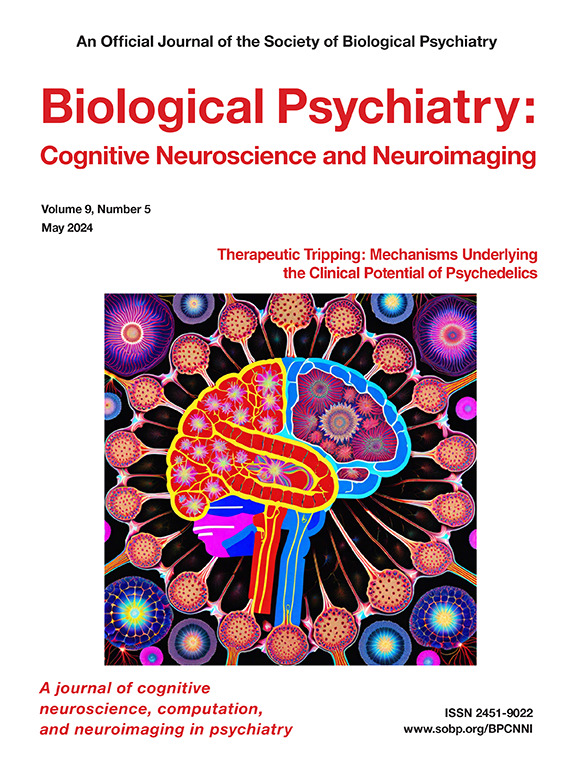利用脑电图推进正念科学:新兴方法和途径调查。
IF 4.8
2区 医学
Q1 NEUROSCIENCES
Biological Psychiatry-Cognitive Neuroscience and Neuroimaging
Pub Date : 2025-04-01
DOI:10.1016/j.bpsc.2024.09.012
引用次数: 0
摘要
在沉思神经科学的短暂历史中,脑电图(EEG)一直是用于阐明正念的神经相关性和机制的宝贵而持久的方法。在这篇综述文章中,我们提醒大家不要将长寿与过时混为一谈,脑电图仍然为解决当今该领域普遍存在的关键问题和挑战提供了非凡的前景。为此,我们从研究策略和实验设计的角度概述了脑电图的独特优势,然后重点介绍了一系列新的复杂数据分析方法和转化范例。在此过程中,我们提供了我们自己的工作和更广泛的文献中的示例,以展示如何利用这些创新来激发新的见解,并促进正念的基础科学和转化应用方面的进展。最后,我们认为脑电图对沉思神经科学仍有许多贡献,并希望引起其他研究人员的兴趣,充分利用脑电图的能力,最大限度地发挥其在该领域的潜力。本文章由计算机程序翻译,如有差异,请以英文原文为准。
Using Electroencephalography to Advance Mindfulness Science: A Survey of Emerging Methods and Approaches
Throughout the brief history of contemplative neuroscience, electroencephalography (EEG) has been a valuable and enduring methodology used to elucidate the neural correlates and mechanisms of mindfulness. In this review, we provide a reminder that longevity should not be conflated with obsoletion and that EEG continues to offer exceptional promise for addressing key questions and challenges that pervade the field today. Toward this end, we first outline the unique advantages of EEG from a research strategy and experimental design perspective, then highlight an array of new sophisticated data analytic approaches and translational paradigms. Along the way, we provide illustrative examples from our own work and the broader literature to showcase how these innovations can be leveraged to spark new insights and stimulate progress across both basic science and translational applications of mindfulness. Ultimately, we argue that EEG still has much to contribute to contemplative neuroscience, and we hope to solicit the interest of other investigators to make full use of its capabilities in service of maximizing its potential within the field.
求助全文
通过发布文献求助,成功后即可免费获取论文全文。
去求助
来源期刊

Biological Psychiatry-Cognitive Neuroscience and Neuroimaging
Neuroscience-Biological Psychiatry
CiteScore
10.40
自引率
1.70%
发文量
247
审稿时长
30 days
期刊介绍:
Biological Psychiatry: Cognitive Neuroscience and Neuroimaging is an official journal of the Society for Biological Psychiatry, whose purpose is to promote excellence in scientific research and education in fields that investigate the nature, causes, mechanisms, and treatments of disorders of thought, emotion, or behavior. In accord with this mission, this peer-reviewed, rapid-publication, international journal focuses on studies using the tools and constructs of cognitive neuroscience, including the full range of non-invasive neuroimaging and human extra- and intracranial physiological recording methodologies. It publishes both basic and clinical studies, including those that incorporate genetic data, pharmacological challenges, and computational modeling approaches. The journal publishes novel results of original research which represent an important new lead or significant impact on the field. Reviews and commentaries that focus on topics of current research and interest are also encouraged.
 求助内容:
求助内容: 应助结果提醒方式:
应助结果提醒方式:


